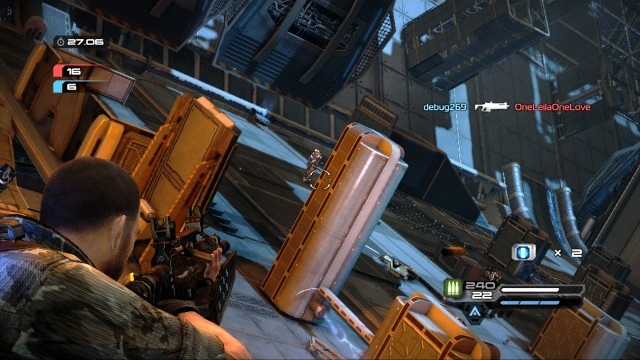Better than you think, worse than it could have been.
Wise men like to say that there are only two guarantees in life: death and taxes. Well, friends, I'm feeling gutsy enough to add a third. I guarantee that you have played far worse shooters than Inversion. I'd bet money on it. Not only because there are so many terrible FPSs out there, but because it honestly isn't as bad as some reviewers and internet trolls would have you believe. Ultimately, it's a solid cover-based shooter in the Gears of War tradition (it is technically a tradition by now, right?) but is unable to reach that threshold both technically and narratively.
Visually, the game world is gorgeous as long as you don't look at the characters for too long. While the locales themselves run the gamut of well-tread shooter tropes from “ruined metropolis” to “high-tech space station”, the imaginative ways in which they are twisted and contorted are impressive. The world of Inversion suffers from some kind of mass gravitational anomaly that seems to exist solely for the amusement of the game's level designers. While the plot never really explains why gravity is so FUBAR'd, it makes for some visually surreal firefights and set pieces. Waging war while standing on the wall of a skyscraper as remnants of other buildings float by in zero gravity is a real mind job that keeps the environments from getting stale.
The same cannot be said, however, for our protagonists or the hordes of generic, feral humanoids they slaughter by the handful. Technically, they're fine. The models aren't lacking for polygons or detailed textures. They're just crushingly plain and would be considered so by any modern standards. You'll beg for the laughably bulky and facially caricatured goons of Epic's recent offerings inside of your first hour with David Russell and Leo Delgado, the heroes of our story. They look like late-'90s action flick dropouts with slightly better hair—which is better than I can say for their enemies.
From start to finish, you'll fight waves of mostly bald, muscled dudes with slightly different guns and armor. It's like someone made a bunch of clones of Mr. Clean, sent them all to a thrift shop with a $10 spot, and told them to “treat themselves”. The only real break from this is during your frequent boss battles against Slave Drivers, a big guy who looks sorta like Jabba the Hut with legs and coimmands his slaves to attack you. This is more or less the visual equivalent of having Sloth from The Goonies sick a pack of homeless people on you (or strangely enough, taking the MUNI in San Francisco).
Fortunately, fighting them is a lot more entertaining thanks to a slew of neat gravity-related abilities that help elevate the gameplay beyond a mere Gears clone. With a device conveniently provided by their would-be invaders, David and Leo can fire pulses of energy that can either increase or decrease the force of gravity at the location they hit. This starts with simple applications like shooting enemies with a low-gravity shot to lift them up and out from behind cover or hitting a heavy overhanging object with a shot of high gravity to make it drop down and crush enemies below.

Things get significantly more interesting when you gain the ability to manipulate and toss objects that have been floated with low-g. For instance, you can kill a distant, RPG-wielding enemy by lifting him out of cover, pulling him toward you with the grav-link, performing a melee finisher on him while he hangs helplessly before you, and then grab his launcher to blow up his buddies. Creative players will find plenty of neat ways to wreak havoc with these powers, and it's all complemented with a highly destructible, physics-driven world that begs to be ravaged. The fun is just as devious as it sounds, but sadly, it doesn't come without a price.
Between the dynamic shadows, destructible environments, and all the physics-intensive tomfoolery, the game demands a lot out of current-gen consoles. While it mostly keeps it together at an acceptable framerate, the game does everything a half step slower than the expected pace. To call it “sluggish” would be an exaggeration, but it is a bit more, shall we say, deliberate than some players will enjoy. Thankfully, the combat was balanced with this in mind so you never feel as if the game needs you to be faster than it allows, but one can't help but wonder how much more enjoyable it might have been if things happened at a faster rate.

This plays into some of Inversion's larger issues as well. Even between firefights, pacing can feel labored, mostly because the devs felt like throwing in-engine cutscenes before and after nearly every battle, even the minor ones. Granted, they're all pausable and skippable, but I just want to play. I don't need a cutscene informing me that two enemies just appeared and I should take them out. And yet, despite all the real estate afforded to storytelling, it never comes together to form something cohesive or compelling. The requisite pieces for a decent science fiction story are there, but the writers and voice actors seem to have lacked the combination of time, resources, and savvy necessary to assemble them together.
On top of that, some of the rehashed boss battles in the latter third of the game can run long, and the multiplayer is a total throwaway. But the game mostly nails its 30 seconds of fun, and the vistas can be truly dazzling at times. Once you adjust to how ponderously it moves along and dial into the possibilities the gravity gameplay affords, it becomes something memorable, even if it never quite becomes spectacular. And we have no shortage of “spectacular” in this business, while we have a serious deficit of “memorable”. But with an average length (6-8 hours) single-player campaign, and no real reason to replay ir, Inversion holds on to be only a few notches better than passable.
-
Dropping cars on fools with gravity
-
Fun with physics
-
Gorgeous environments and lighting
-
Overall gameplay is a little on the slow side
-
Generic-looking heroes and enemies
-
Story never comes together










